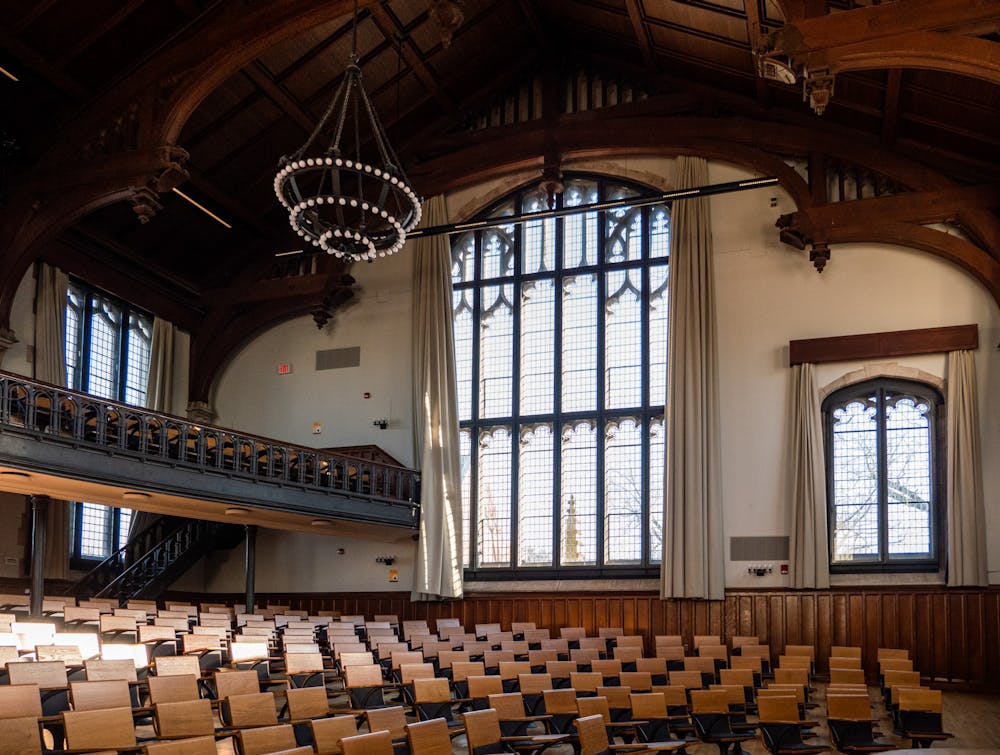While all papers, projects, and problem sets were due on Dean’s Date, the work was not over for students enrolled in the 133 courses that had in-person final examinations, out of 1332 total courses. All final exams took place this semester between Friday, May 12 and Thursday, May 18.
Scheduled final exams, once nearly-universal among courses, now have a variety of alternatives. Humanities courses are more likely to assign a term paper due on Dean’s Date and courses in engineering may assign an open-book take-home exam or final project.
The change has implications for disciplinary proceedings. While violations of academic integrity during scheduled exams are adjudicated by the student-run Honor Code, other forms of assessment have violations referred to the Committee on Discipline, which is not run by students.
The Daily Princetonian analyzed the past three semesters’ final exam schedules. These semesters are the ones with fully in-person exams after the COVID-19 pandemic. A surge in cases made most finals remote after a mostly in-person semester in Fall 2021. Cross-listed courses are counted towards the first department listed. Courses satisfying multiple distribution requirements are counted towards both distributions.
Exams skew towards the natural sciences, language courses and intro level courses and tend to be held in McCosh Hall, East Pyne Hall, and the Friend Center. Schedules have varied by years, with more evening exams this term.
Finals are more common for intro courses. 100-level courses, primarily large intro courses, were the most likely to have scheduled finals, with 18.62 percent of 100-level courses having finals. In contrast, only 5.94 percent of 400-level courses, which skew towards small seminars, had scheduled finals.

The biggest indicating factor for whether a course has a scheduled final or not is its field. Within distribution requirements, those with primarily STEM courses ⸺Quantitative and Computational Reasoning (QCR) and Science and Engineering with and without a lab (SEN/SEL) ⸺ were most likely to have a final. 52.38 percent of SEN courses had finals as compared to 1.19 percent of the University’s newest distribution requirement, Culture and Difference.

The departments with scheduled final exams were dominated by language departments with some departments approaching 100 percent of classes with final exams in the semesters analyzed. The relative rankings between language departments have varied each semester. The Integrated Science Curriculum (ISC), a specific curriculum for first-years with its own department code also ranked among the language departments.
Of non-language departments, the departments with the most scheduled exams were primarily STEM disciplines, with economics being the only exception. Interestingly, the departments were also all in the natural sciences, including physics, chemistry, mathematics, and quantitative and computational biology. No engineering departments made the list, possibly because some courses in engineering assign final projects instead of exams.
The most popular buildings for final exams included East Pyne Hall ⸺ home to a number of primarily humanities departments ⸺ , the Friend Center, and McCosh Hall. According to Princeton Conference and Events Services, McCosh Hall, where 16 courses held their finals this semester, is the “most ‘quintessentially Princeton’ building.” In this spirit, McCosh Hall contains the University's two largest lecture halls, McCosh 50 and McCosh 10, with 465 and 350 seats, respectively. Four of the sixteen courses whose finals were held in McCosh hall required two exam rooms for the exam.
“Students are required to sit in every other seat for final exams,” University spokesman Michael Hotchkiss said in an email to the ‘Prince’. “We do not have classrooms large enough for all students of bigger lecture courses to all sit in the same room for an exam with every other seat being empty, therefore we schedule multiple rooms for these exams.”
East Pyne Hall, where 13.5 percent of in-person final exams took place, contains many small and medium classrooms, with only one room having a capacity of over 60 people.
Friend Center and the Computer Science building are connected and, if counted together, those buildings hosted the most finals for Spring 2023 with 21 exams total.
Final exams are in three hours slots, starting at 9:00 a.m., 1:30 p.m., or 7:30 p.m. Over 30 percent of finals analyzed began at 7:30 p.m. Students with a 9:00 a.m. final the morning after a night final cannot postpone one of these two exams. Final exam policy states postponements may only be requested for religious observance, multiple finals in one day, or three exams over a two day period.
“An optimization tool is used to determine a schedule that minimizes conflicts between exams within the exam policy,” Hotchkiss wrote. “The time blocks are set to allow for required exam seating of three hours with as much time between as possible for meals, classroom change over, and accommodation requirements.”
The percentage of evening finals seems to vary by semester. In the Fall 2022 semester, evening finals only occurred on the first four days, and made up 14 percent of total finals, as compared to 31 percent of total finals during Spring 2023 spread across all seven days of the finals period.
“Final exams are scheduled at specific times set by the registrar’s office to make efficient use of the seven days of the exam period,” Hotchkiss said.
Fifteen final exams during the Spring 2023 semester began at 9:00 a.m. on weekend days. To have breakfast before these exams, students’ only option was the Whitman College dining hall, open for breakfast on weekends from 7:30 a.m. until 9:30 a.m., while all other dining halls open only for brunch at 10:00 a.m. or 11:00 a.m.
The last day of final exams was Thursday, May 18.
Andrew Bosworth is a Data contributor for the ‘Prince’.
Please send corrections to corrections[at]dailyprincetonian.com.








